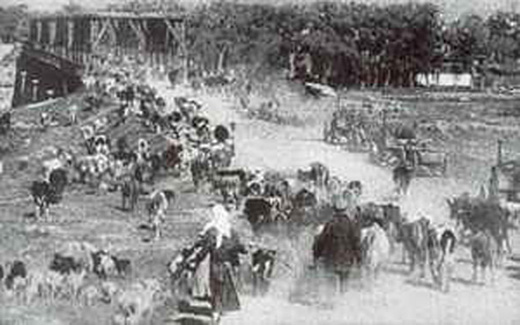Eastern Front
The Soviet front is reorganized in three sectors, northwest, with the Baltic and Northern fleets, entrusted to Kliment E. Voroshilov; western, placed under the command of Semyon K. Timoshenko; southwestern, with the Black Sea fleet, entrusted to Budenny. Each of these commanders is given a politico-military adviser: Andrei Zhdanov, Nikolai Bulganin and Nikita Khrushchev.
Battalions are also raised for service in the big cities. All men between the ages of 16 and 60 and women between 18 and 50 are called up to take part in civil defense. Positions are to be defended to the last man; the line to be held at all costs, according to the Soviet leaders, is from Smolensk to Moscow.
Gen Franz Halder, chief of the German general staff, notes in his Diary that the task given to the German armed forces may be considered fulfilled if the bulk of the enemy are driven back beyond the Dvina and the Dniepr.
NORTHERN SECTORThe marshy and woody terrain is hindering the advance of the panzers, but the Soviet 8th, 11th and 27th Armies are falling apart under the relentless German assault.
CENTRAL SECTORResistance in the Bialystok Pocket ends. The Soviet 3rd and 10th Armies have been destroyed, the 4th and 13th Armies reduced to remnants. The Germans have taken 290,000 prisoners, 2,500 tanks and 1,500 artillery pieces. Meanwhile, the 19th Panzer Div forces a crossing of the Disna.
SOUTHERN SECTORThe Soviets suffer heavy losses attempting to destroy Axis bridgeheads on the Prut River. The XLVIII Rifle and II Mechanized Corps in particular incur severe losses.[MORE]
[Italian East Africa
In southern Abyssinia the Italian resistance comes to an end with the surrender of Gen Pietro Gazzera and 7,000 troops to a Belgian unit. In the northwestern Gondar area there are more Italian surrenders around Debra Tabor.
[Mediterranean
The British submarine Upholder sinks the Italian steamer Laura Cosulich (5870t) east of Calabria.
[Soviet Union, Home Front
Stalin broadcasts for the first time since the German invasion. The reason for his delay in responding is not clear. He admits the loss of Lithuania, parts of Byelorussia and the western Ukraine. He says that the Germans are not invincible and reminds his listeners of Napoleon. He also defends the non-aggression pact of 1939 with Germany saying it was dictated by the USSR's desire for peace. He calls for total effort and a policy of scorched earth before the German advance, and guerilla warfare in their rear. 'We must not leave... a single kilogram of grain or a single liter of petrol to the enemy. It is necessary to create in invaded areas conditions unbearable to the enemy.' He announces the setting up of a national committee of defense presided over by Stalin himself along with Vyacheslav Molotov, Kliment Voroshilov, Georgi Malenkov and Lavrenti Beria. The broadcast is the first of many to emphasize patriotic nationalism, 'our patriotic war against German Fascism', rather than Communist ideals.
'Scorched Earth' Policy in Action |
 |
Syria
Deir el Zor falls to the troops from 10th Indian Div. The Vichy fort at Palmyra surrenders to Habforce after a long defense.
[